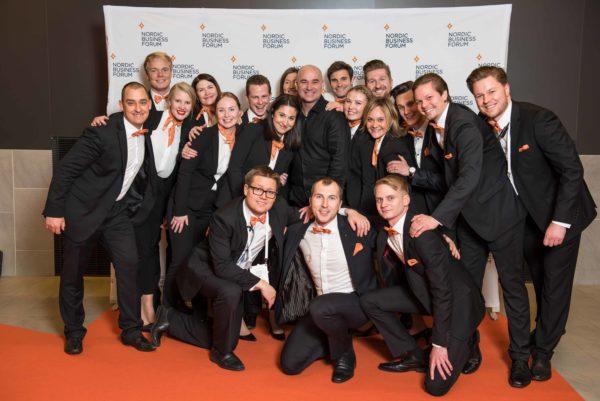8Aug2017
Welcome to our 2017 Speaker Spotlight series!
Each week we will feature some of the faces from our incredible lineup at NBForum 2017 in Helsinki this October. While you’re here, make sure you grab your Live Stream license today!
We are experiencing a shift. The American, European and Asian markets are growing, Brazil and Russia’s economies are improving, and inflation is a mild concern. This recovery has been driven by several factors that are redefining the competitiveness landscape. Success in business will be determined by the ability to adapt to the new mindset.
Stéphane Garelli, University of Lausanne’s Emeritus Professor of World Competitiveness and author of Top Class Competitors, sat down with us to discuss his research into factors affecting competitiveness at the national, corporate, and individual level.
Nordic Business Forum: You’ve spoken a lot about the competitiveness of nations. Could you explain the impact of a nation’s political situation on its competitiveness?
Stéphane Garelli: Competitiveness of nations looks at how a country manages a network of resources and competencies in order to achieve prosperity — and most countries have to manage not only one success story but many success stories. Some of these aspects are related to resources like raw material, infrastructure, and other competencies like education. It’s a globality of resources that make a country successful.
Now, this has an impact on companies because a lot of these issues are defining the future of a company. Take, for example, infrastructure, whether it is traditional (railroads or roads) or advanced (broadband communications, IT, etc.) The other aspect is the quality of the education system. At every level — primary, secondary, university, and apprenticeship – everything is very much influenced by policy and the state’s enforcement. And then, of course, there are much more straightforward issues like taxation.
At the end of the day, it means that a company cannot ignore what a country or the global environment is doing. How well you interface with these factors will define your success.
NBF: Globalization has been a major factor in global economic and market shifts. What role does globalization play today?
SG: Globalization has gone very quickly because companies have access to much lower costs of production abroad, whether it is wages, access to raw materials, or processes. Now, there is a question of whether this trend is slowing down drastically. There are many reasons for the deceleration:
(1) price increases. It’s natural… As wealth goes up, so do labor costs in many countries.
(2) complexity. Companies have discovered that managing operations on the other side of the world is not easy. It calls for complexity in management, and problems with copyright protection.
Now, a trend we are seeing is that companies want to re-shore, which means bringing a business closer to home. Technology has enabled them to do this. For example, a factory that makes shoes, or computer parts, can be brought closer to home because technology — automatization, artificial intelligence, 3D printing — can make operations successful and keep costs low. This is a huge revolution.
This does, however, create problems in many emerging economies because they are losing their factories. And surprisingly enough, it creates also some problems in Europe and the US because the new, fully-automated factories are not recreating the blue-collar jobs which were lost when they went abroad for globalization. New jobs are white-collar, like robotics and artificial intelligence experts. The people who lost their jobs don’t find them again, which explains a lot of the tension.
NBF: You have referred to adapting to the “evolution of society’s values” as a key point in the mindset of competitiveness. What does it take for a company to be successful today given everything we have discussed?
SG: Companies must understand that, to a certain extent, we are all victims of our environment. Whether it is Brexit, the policy of the US, the reform in international taxation, the emergence of global companies from the emerging countries, the price of commodities… this is all having an impact on the global environment – what I call the context of competitiveness. This context is going to be shaped by three things:
(1) The global economic environment;
(2) The technological revolution (such as artificial intelligence, etc.);
(3) The evolution of the values in society.
And no enterprise is living in a bubble; we cannot operate in isolation of what is happening around us.
NBF: Your latest book, entitled Are You a Tiger, a Cat, or a Dinosaur?, outlines a model for evolving employee motivation. How did you come up with this model?
SG: It was the result of experience in companies. One of the critical aspects that I have seen in companies is that they often have a very strong corporate culture that tends to ignore the value system of their employees. They tend to ignore the fact that their employees/colleagues have a value system that is evolving with time in the company and with age.
All of us start our life in a company as a tiger; we are extremely active, mobile, and ready to attack everything. We want to succeed. Tigers perceive their lives in terms of corporate success. But after a certain time, you get married, settle down with a house and children, and you get comfortable. Your objectives in life change and that’s when you transition to a cat. You are still working 40/50 hours a week, but you want to have work-life balance. You are still very mobile, but you want to be back on the weekend to see your family. And then after many, many years, there is another transformation from a cat into a dinosaur, which means that you are interested in the life-life balance. This is when you start to think about the next step in your life. And the three are totally legitimate!
NBF: Why should this model matter to companies who are trying to be competitive on a global scale?
SG: A lot of companies do not realize that if you tell a cat that he or she will be promoted and be transferred to Turkmenistan, they might not be excited. They will need to consider their partner, their mortgage, their children, their cat, dog, goldfish… etc. And most probably, the cat will decline the promotion and quit because they don’t see any other way of moving up in this company. What the company sees as a good opportunity and promotion is going to turn into a big embarrassment.
This is the kind of mistake that companies continue to make: considering that all of their employees are tigers. We are tigers until a certain stage, and some do consciously remain tigers all their life, but there are very very few of them. Unless a company adapts its value system — its work structure — to the evolution of the value system of its employees, they will lose the bet. And this is epitomized even more today with the millennials. This new generation has a different set of values, different perspectives, and you’re not going to change them. It’s up to the company to change.
We’re excited to learn more from Stéphane Garelli at NBForum 2017! We’re already sold out, but if you’d like to hear Garelli and other leaders discuss this year’s themes of purpose, responsibility, and leadership, be sure to grab your Live Stream license today. Follow us on Facebook (@NBForumHQ) and Twitter (@NBForumHQ and #NBForum2017) to keep up with our speaker announcements as we get closer to the event!

 by:
by: 
